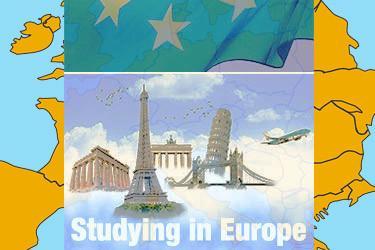Third Level Study in Europe

With the high points required by Ireland’s CAO system, many students have chosen to pursue third level education in Europe. It is a trend that has grown in the past decade and for some of those students who may not have the points they require for their desired CAO course it has proven a valuable option.
In Europe, rather than Ireland’s vast selection of institutes such as universities, institutes of technology (ITs) and colleges of education, there are three main types of university: private universities, research universities and universities of applied sciences (UAS). UAS are similar to Ireland’s ITs and are mainly in Northern Europe, while private universities charge higher fees.
It is possible for students to study degrees in a wide range of subjects, including; Arts & Humanities, Science, Engineering, Business and Computers & IT, all studied through English. It is also of benefit that students who qualify for the maintenance grant in Ireland can also claim this grant if they are enrolled in public programmes in Europe (more details available on www.suzi.ie).
Some of the benefits of studying in Europe:
- Language is not a barrier as many programmes are taught in English (English is the international language of business, IT, engineering and science). There are approximately 900 courses across Europe taught in English, in a variety of subjects, and the number continues to grow each year.
- It is beneficial for future employment. International experience enhances a CV. A student who returns to Ireland to work will bring contacts and relationships with them which are an asset to any employer and a student who chooses to work abroad before returning, will be more attractive for prospective employers due to the experience they have gained
- Due to the low birth rates in continental Europe for the past few years, there is a shortage of students to fill their college places and so there is an opportunity for Irish students to attend universities that are highly ranked internationally.
- In some countries, it can be cheaper to study abroad than in Ireland. For example, in Sweden and Denmark there are no tuition fees, whereas in other countries such as Germany there is only a semester fee ranging between €200-€300 to be paid twice a year. As well as college costs, living costs can also be less expensive than some Irish options such as Dublin or Cork.
- Most EU countries work on the idea that everyone has a right to third-level education without being selected by grades or points. For example, in Holland, universities are prohibited by the state from choosing students based on grades. Across the rest of Europe, grade requirements are lower than Ireland and some courses, such as psychology, may include an interview or exam.
Applications remain open into the Summer months for a large amount of courses, mainly in universities of applied sciences and private universities, as well as some research universities. Students should still contact universities even if the deadline has passed, as some will consider late applications.
Eunicas is an independent application support service for students are applying to study abroad. Details of over 900 English taught, third-level courses in Europe are listed on their website www.eunicas.ie.
Websites such as the European Youth Portal & www.worldwide.edu also offer useful resources for anyone considering Europe as a third level option.
There are plenty of alternatives to the traditional CAO route available and studying in Europe offers the opportunity to experience new cultures and gain valuable life experience. So if you’re feeling adventurous then why not find out more about the wide range of third level courses available in Europe.
Author: Fiona McBennett





